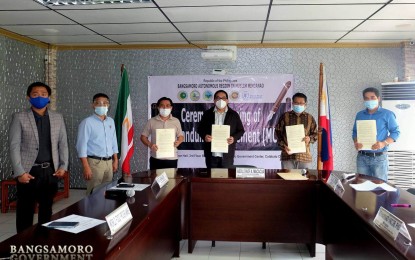
CONVERGENCE. Minister Abdulraof Macacua (center) of the Ministry of Environment, Natural Resources, and Energy displays the memorandum of agreement signed on Wednesday (July 29, 2020) for the establishment of vegetable 'survival gardens' as models for integrated rural development in the region. The other parties involved in the project are BARMM's Ministry of Agriculture, Fisheries, and Agrarian Reform, the Ministry of the Interior and Local Government, and the World Food Programme of the United Nations. (Photo courtesy of BPI-BARMM)
COTABATO CITY—Various ministries of the Bangsamoro Autonomous Region in Muslim Mindanao (BARMM) signed an agreement Wednesday with the World Food Programme (WFP) for the establishment of farm model sites for integrated rural development in the region.
Among the BARMM offices involved in the partnership agreement with WFP were the Ministry of Environment, Natural Resources, and Energy (MENRE); the Ministry of Agriculture, Fisheries, and Agrarian Reform (MAFAR), and the Ministry of the Interior and Local Government (MILG).
“This to ensure a self-reliant, self-sustaining food security program for the Bangsamoro region,” MENRE-BARMM Minister Abdulraof Macacua told reporters.
Macacua, who is also concurrent BARMM executive secretary, said the model sites aims to establish sustainable income-generating activities to support integrated rural development for an increase in agricultural and agroforestry production.
He said the project will be implemented through the MENRE's 'Integrated Bangsamoro Greening Program (IBGP) and "Kayod ka, Bangsamoro" (KKB). MAFAR-BARMM, for its part, will lead the supply of vegetable seeds, the conduct of farmers’ training, and the establishment of market linkages for the undertaking.
"The KKB came into the picture as a livelihood component of the integrated Bangsamoro greening program to address the issue of food shortage amid the coronavirus disease 2019 economic crisis,” Macacua said.
He said the project is also in line with MENRE-BARMM's memorandum on massive food production on forestland areas suitable for vegetable gardening and short-term cash-crop production.
"MENRE has been encouraging the growing of vegetables and cash-crops in the backyards of our homes to supplement the supply of each family’s food," Macacua said.
On the other hand, the MILG-BARMM will lead the implementation and mainstreaming of the Convergence Area Development Plan among the beneficiary communities and local government units (LGUs).
The WFP will provide remunerations for the family members of former Moro Islamic Liberation Front combatants during the three months per area while waiting for the crops to be harvested.
The MENRE-BARMM said it has identified 12.5 hectares of vegetable “survival gardens” across the provinces of Maguindanao and Lanao del Sur for the project.
The regional environment office has also laid out planting materials consisting of forest trees and agroforestry crops like cacao, coffee, and selected fruit-bearing trees to be cultivated in the planting sites.
“Palaw” rangers, the local term for forest guards who are MILF combatants waiting to be decommissioned, will aid in the establishment and sustaining of the ‘survival gardens’ to ensure productivity and output efficiency.
Macacua said the convergence will be implemented from September 2020 to March 2021. (PNA)
